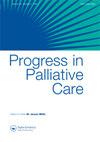A national collaborative to spread and scale paramedics providing palliative care in Canada: Breaking down silos is essential to success
IF 0.8
Q4 PUBLIC, ENVIRONMENTAL & OCCUPATIONAL HEALTH
引用次数: 8
Abstract
A national collaborative has been launched in Canada to spread and scale up the Paramedics Providing Palliative Care model. This builds on the knowledge that paramedics in the 9-1-1 (emergency/unscheduled) and scheduled models of care are both historically and currently asked by the public to provide urgent symptom relief within the context of a palliative approach, and that approximately 40% of dying people visit the emergency department in the last two weeks of life despite 70% wishing to die at home. A model of care including a palliative care clinical practice guideline or protocol, specific training, and a mechanism for sharing of goals of care, has been proven to improve the palliative and end of life experience for patients with palliative care needs and their families. It increases the comfort and confidence of paramedics and has benefits to the broader health system. Meaningful and very broad stakeholder engagement and inter-sectoral collaboration is absolutely essential to the success of this innovative approach to care.在加拿大推广和扩大护理人员提供姑息治疗的全国性合作:打破孤岛是成功的关键
加拿大发起了一项全国性合作,以推广和扩大“医护人员提供姑息治疗”模式。这建立在这样一个知识的基础上,即9-1-1(紧急/计划外)和计划外护理模式的护理人员在历史上和目前都被公众要求在姑息治疗的背景下提供紧急症状缓解,大约40%的垂死者在生命的最后两周去急诊科就诊,尽管70%的人希望在家中死去。一种护理模式,包括姑息治疗临床实践指南或方案、特定培训和护理目标共享机制,已被证明可以改善有姑息治疗需求的患者及其家人的姑息治疗和临终体验。它增加了医护人员的舒适度和信心,对更广泛的卫生系统也有好处。有意义和非常广泛的利益相关者参与和部门间合作对于这种创新的护理方法的成功至关重要。
本文章由计算机程序翻译,如有差异,请以英文原文为准。
求助全文
约1分钟内获得全文
求助全文
来源期刊

PROGRESS IN PALLIATIVE CARE
PUBLIC, ENVIRONMENTAL & OCCUPATIONAL HEALTH-
CiteScore
2.60
自引率
11.80%
发文量
24
期刊介绍:
Progress in Palliative Care is a peer reviewed, multidisciplinary journal with an international perspective. It provides a central point of reference for all members of the palliative care community: medical consultants, nurses, hospital support teams, home care teams, hospice directors and administrators, pain centre staff, social workers, chaplains, counsellors, information staff, paramedical staff and self-help groups. The emphasis of the journal is on the rapid exchange of information amongst those working in palliative care. Progress in Palliative Care embraces all aspects of the management of the problems of end-stage disease.
 求助内容:
求助内容: 应助结果提醒方式:
应助结果提醒方式:


